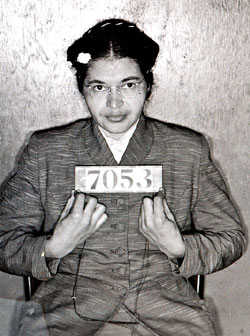STAND UP AND CRY OUT:
Rosa Parks and the Defense of Our Civil Liberties

By Dee Dee Vega
One hundred days before Rosa Parks refused to give up her seat on a Montgomery, Alabama bus, fourteen-year-old Emmett Till
was brutally tortured, killed, lashed to a fan blade with barbed wire and cast to the bottom of the Tallahatchie River in
Money, Mississippi for whistling at a white woman. It has been said that it was young Emmett whom Ms. Parks was thinking
about as she was being arrested. Of course, Rosa Parks’s arrest led to the Montgomery Bus Boycott orchestrated by the then
twenty-six year old Rev. Martin Luther King, an event that jump-started the American Civil Rights movement. The advantage of history
has afforded us the ability to see the intricate connections and individual importance of these events.
Ms. Parks passed away this October at the age of 92 and her death rightly received grand attention from the media and
political leaders for her contribution to the moral welfare of the American people. Her Detroit funeral was attended by thousands
of people who sought to both pay their respect to her memory and come together to remember the importance of our continued work
in civil rights and equality. Fifty years earlier, thousands were lining up to see the mutilated body of Emmett Till at his
funeral for those same reasons. It is only today, in 2005, that there is a possibility of any justice and peace for Emmett Till
as a private citizen and activist Keith Beauchamp, interviewed this month by fRINGE, took up Emmett’s cause and investigated
the case on his own leading to possible indictments for those people still alive that played a role in his death.
When we’re confronted by the iconic examples of Rosa Parks or even Emmett Till in the media, it is very easy to become complacent
in our struggle to continue to fight for civil rights for people of color, women and gay Americans under the law and to stand up
and defend what is left of our civil liberties. Jesse Jackson said that Rosa Parks “sat down in order that we might stand up,” and
this does not just mean that Parks’s action catalyzed the change of law, it means that all people have an example to whom we may
look for guidance when we are asked by the law to do something that is simply wrong.
In one sense, Rosa Parks’s refusal to give her seat to a white man was a deliberate act of defiance and personal dignity to which
we all aspire. But we are able to exercise these simple acts of defiance every day. When someone tells a racist joke—say no. When
we are tempted to judge a relationship between two people of the same sex as less important than our own—say no. When we see a
Hispanic man and assume he must be a janitor or criminal, we can then say no.
It is not unrelated that the New York American Civil Liberties Union stood in court on the very day of Rosa’s funeral arguing that
the systematic harassment of New Yorkers who are asked to submit to random search in the transit system by the corrupt and
immoral New York City Police Department is indeed a violation of our civil liberties, our right to a dignified life. Thankfully,
we have organizations like the NAACP and the ACLU to defend this American dignity, but we must persevere as well. Dr. King wrote
“No one can understand the action of Ms. Parks unless he realizes that eventually the cup of endurance runs over, and the human
personality cries out ‘I can take it no longer.’” When you are asked to open your bag by the police, what will you do? You will
say no and think of Rosa Parks. This is the best way people of all colors can continue her spirit, by defending the civil rights
and liberties due to all people.
* The author's decision to include the famous mug shot of Rosa Parks, rather than any other photo, was intended to place Ms. Parks in the context of other great women such as Angela Davis and Assata Shakur who challenged the corruption of the law and paid for it with their personal freedom. DV
|
















